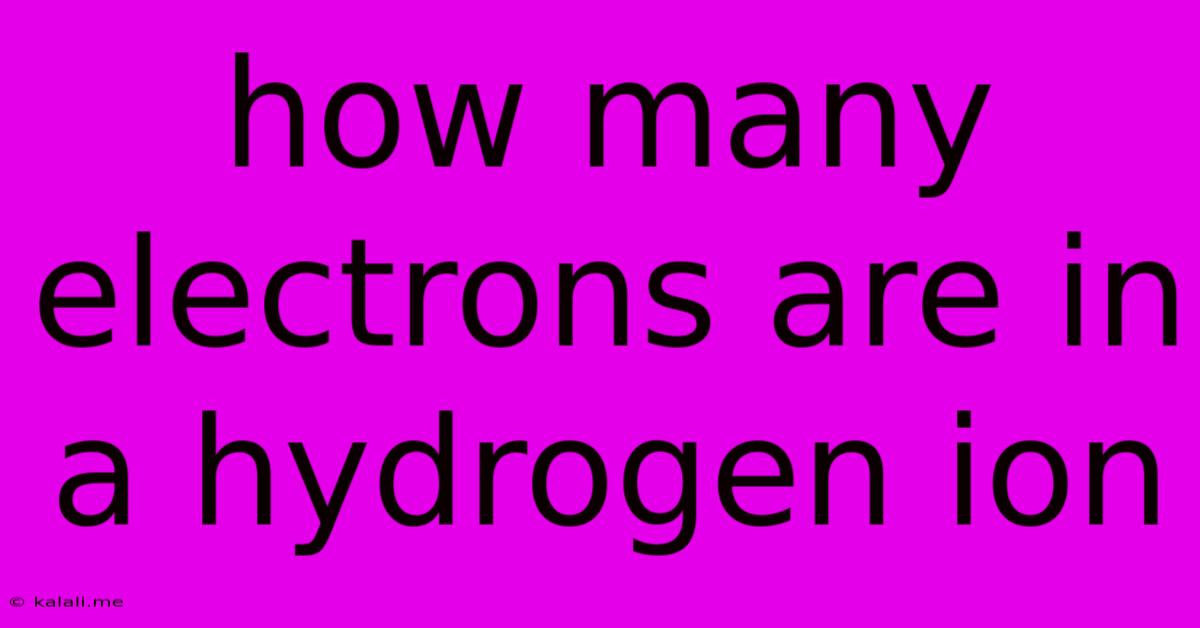How Many Electrons Are In A Hydrogen Ion
Kalali
Jun 15, 2025 · 2 min read

Table of Contents
How Many Electrons are in a Hydrogen Ion? A Deep Dive into Ionic Charges
This article will explore the number of electrons in a hydrogen ion, explaining the concept of ionization and its implications for the hydrogen atom. Understanding ionic charges is crucial in chemistry and physics, and this detailed explanation will provide a clear understanding of this fundamental concept. We'll also delve into the different types of hydrogen ions and their applications.
What is a Hydrogen Ion?
A hydrogen ion (H⁺) is a positively charged ion derived from a hydrogen atom. A neutral hydrogen atom consists of one proton and one electron. The key to understanding a hydrogen ion lies in the process of ionization. Ionization is the process where an atom gains or loses electrons, resulting in a net positive or negative charge. In the case of a hydrogen ion, the hydrogen atom loses its single electron.
The Electron Count: Zero
The answer is straightforward: a hydrogen ion (H⁺) has zero electrons. This loss of its only electron leaves behind a single proton, which carries a positive charge (+1). This positive charge is what defines the hydrogen ion.
Types of Hydrogen Ions and Their Significance
While the most common hydrogen ion is simply H⁺ (a single proton), it's important to note some nuances:
- H⁺ (Proton): This is the simplest form, essentially a lone proton. It's highly reactive due to its strong positive charge and plays a crucial role in acid-base chemistry, influencing pH levels.
- Hydronium Ion (H₃O⁺): In aqueous solutions (solutions containing water), H⁺ rarely exists independently. It readily bonds with a water molecule to form a hydronium ion (H₃O⁺). This is often the more accurate representation of a hydrogen ion in many chemical contexts. The overall positive charge remains, but the proton is now associated with a water molecule.
Applications and Importance
Hydrogen ions and their related forms are fundamental in numerous chemical and biological processes:
- Acid-Base Chemistry: The concentration of H⁺ (or H₃O⁺) determines the acidity or pH of a solution.
- Electrochemistry: Hydrogen ions are involved in various electrochemical reactions, including fuel cells and batteries.
- Biology: Proton gradients across cell membranes are crucial for energy production (ATP synthesis) in living organisms.
Understanding the Concept of Ions
The concept of a hydrogen ion is essential for understanding ions in general. Ions are atoms or molecules that have gained or lost electrons, resulting in a net electrical charge. Cations are positively charged ions (like H⁺), while anions are negatively charged ions. The formation of ions significantly affects the chemical properties of the atom or molecule.
In conclusion, while a hydrogen atom possesses one electron, a hydrogen ion (H⁺) contains zero electrons due to ionization. This fundamental difference dramatically alters its chemical behavior and its role in various scientific fields. Remember to consider the context, as the hydronium ion (H₃O⁺) is a more realistic representation in aqueous solutions.
Latest Posts
Latest Posts
-
Lcm Of 12 4 And 8
Jun 15, 2025
-
Which Of The Following Are Balanced Equations
Jun 15, 2025
-
Group Of Stars That Form A Pattern
Jun 15, 2025
-
Which Of The Following Is True About Science
Jun 15, 2025
-
Parts Of A 3 Phase Motor
Jun 15, 2025
Related Post
Thank you for visiting our website which covers about How Many Electrons Are In A Hydrogen Ion . We hope the information provided has been useful to you. Feel free to contact us if you have any questions or need further assistance. See you next time and don't miss to bookmark.